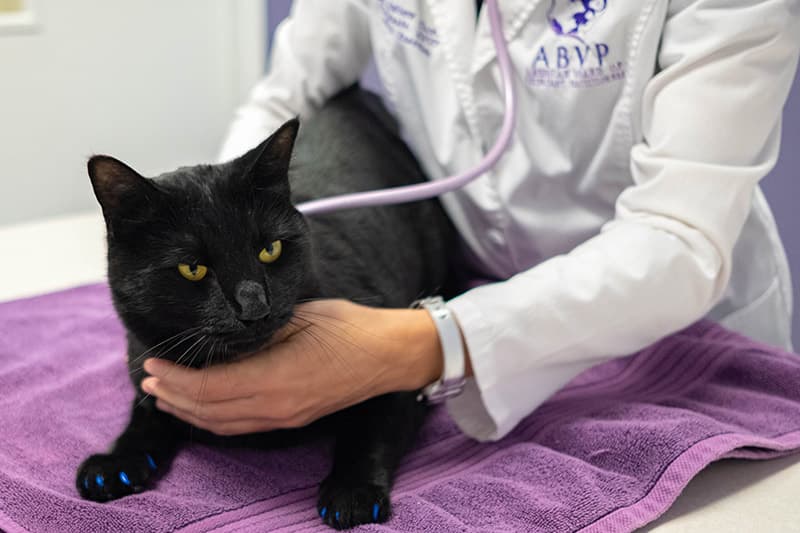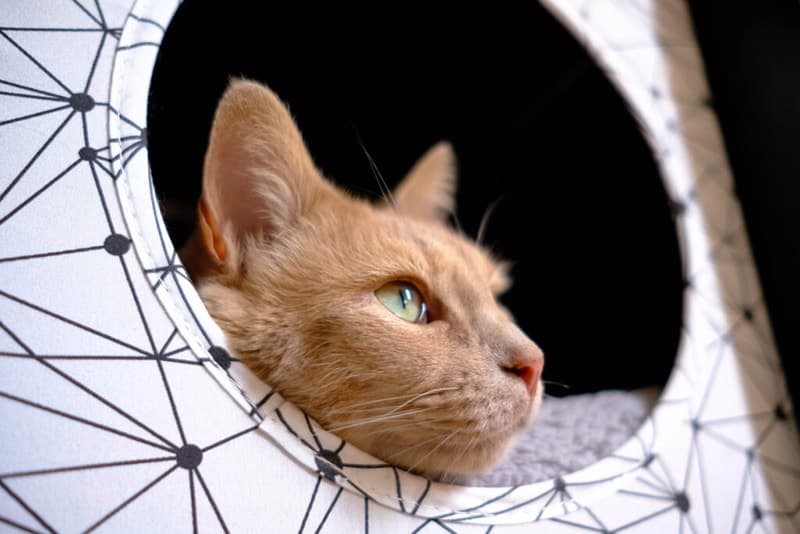All cats scratch. All cats groom. All cats lick.
But any of these things done excessively may indicate a problem! I’m not here to sugar coat it. Let’s talk.
Itchy Cats Fact #1 – You may or MAY NOT see your cat over grooming herself!
In my feline-only veterinary practice we see many itchy cats who are losing their fur and the owners have not seen them lick excessively. This is the case EVEN IN MY OWN HOME! My own cat Sioux, a handsome all black loverboy, will lick the fur on his rear legs bare. Yet I’ve rarely seen him lick (he does it at night). He’s had a complete medical workup and is now on allergy medication.

Some cats scratch so much that they lose hair and/or create sores and scabs on their bodies. Other cats lick obsessively so that they appear balding in places.
Fact #2 – Skin issues can often be a marathon, not a sprint, to diagnose and treat.
When dealing with skin cases, I have to tell my clients that skin issues can be really frustrating! Why? I want to set proper expectations. We can’t always just give them a shot or pill and make it all better. We often have to perform both tests and treatments in order to properly determine the cause.
Fact #3 – The most common cause of itchiness and hair loss in cats in my feline-only hospital is fleas.
 “BUT I DON’T SEE FLEAS ON MY CAT,” you say!
“BUT I DON’T SEE FLEAS ON MY CAT,” you say!
“BUT MY CAT IS INDOORS ONLY,” you say!
“BUT THE FLEAS ARE NOT BITING ME,” you say!
I hear you! I do! But you know what? The unfortunate truth is that fleas are everywhere. (Yes, even in your gated community!). It’s so easy to bring them in on our shoes or other ways. And your cat does not have to be infested with fleas to be affected by them. Some cats can be loaded with fleas whereas other cats may only have a single flea bite and both cats have the same level of itchiness.
I can’t tell you how many times I’ve examined an itchy cat and found one tiny little piece of flea dirt (aka flea poop). Shocked – that’s how the owners feel when I have to tell them that there is evidence of fleas. Excited – that’s how I feel because I’ve found an easy problem that is readily treatable!
This is why the FIRST thing we are going to recommend for ANY cat who is itchy or has hair loss is a monthly flea preventative.
There are many good choices out there. Personally I prefer complete parasite protection with products such as Revolution® Plus because it covers not only fleas but ticks, mites (that ALSO cause skin problems) heartworms and intestinal parasites (yep, indoor cats get all those as well). Revolution® Plus is a topical preventative that dries really fast and is safe for the large majority of cats! Ask your veterinarian about it.
Don’t want a topical preventative? There are oral options as well (but remember, you’ll want to combine it with an oral heartworm preventative too).
Don’t want to apply “chemicals?” These “chemicals” are safe and effective. We use chemicals every day (to wash our hair, to brush our teeth, to treat our infections). You know what I don’t want? For my children to get Cat Scratch Fever (yes, it’s real) or for my cats to get tapeworms from overgrooming those fleas. Remember, I said I wasn’t going to sugar coat it!
The primary active ingredient in Revolution® Plus is called selamectin and it belongs to the macrocyclic lactone family. Ivermectin, which you’ve probably heard of in relation to COVID-19, is structurally related to selamectin. These drugs have been in use for many years and have significant research to back them up.
Do not purchase over-the-counter flea control. Why? It may or may not be safe and it likely does not work well. See your veterinarian for their recommendation. Plain and simple. Talk to your veterinarian about their #1 recommendation and what would work best for you and your cat.
Purchase the products from your veterinarian as online purchases from some of the well-known pet companies (as lovely as they are) do NOT come with guarantees from the manufacturer. In other words, if you don’t purchase the product from a veterinarian, you are not protected against product failure or the rare event of an adverse reaction.
OK, so we’ve beaten the flea talk to death. They are “usually” easy to identify and treat. Do NOT forget to treat your home! If you have fleas on your cat, you have fleas in your home. See your veterinarian for advice on that one! In our clinic, we recommend Flea Busters products.
*FTC Disclosure: This is my only affiliate links in this post. If you make a purchase after clicking on the link I will get a small commission at NO additional cost to you. I only recommend products that I believe in! As an Amazon Associate I earn from qualifying purchases.
It can be a challenge to eliminate fleas in your home, especially if you’re not seeing them. Flea Busters is a product I trust.
Itchy Cat Fact #4 – Other creepy-crawlies (i.e. MITES) can cause itching and hair loss in cats.
There are two kinds of common microscopic mites in cats but thanks to popular use of products such as Revolution® Plus we don’t see these as often anymore. Yay!
Demodex (i.e. Demodectic mange) comes in two types: Demodex cati and Demodex gatoi. One is super contagious (D. gatoi) and one is not (D. cati). If your cat is diagnosed with D. cati your veterinarian will want to consider if she has an immune problem such as Feline Leukemia Virus (FeLV) or Feline Immunodeficiency Virus (FIV).
“Scabies” is caused by the Sarcoptic mange mite which cats CAN but RARELY get. They do, however, become infected with the Notoedres mite, which we call “Feline Scabies” even though it’s not Sarcoptic-type Scabies! Confused? Just know that cats can get microscopic mites that live on their skin. Humans are not the ideal host but occasionally it can be an issue. If they are on a good parasite preventative (such as Revolution® Plus) then they are protected from these mites!
Both Demodex and Scabies are diagnosed by a simple test called the skin scrape, though Demodex can sometimes be difficult to find. But guess what? We often just prescribe Revolution® Plus to cover our bases (notice a theme here?).
Fact #5 – Ringworm is not a worm!
Ringworm is actually a fungal infection of the skin, not a “worm” as the name implies. If you suspect your cat could have ringworm, see your veterinarian ASAP! Ringworm does not always look like a ring! It can look like just about any type of skin infection. Testing is easy, especially now that we can readily perform a “PCR” test which looks for the DNA of the fungus. It’s best to perform the PCR test along with a “fungal culture” for the best and most accurate results. And you’ve probably heard that ringworm is contagious to people.
Itchy Cat Fact #6 – Cats get allergies too! What type?
Food allergies! Food allergies are suspected when your cat is itchy or licking all year long. It can ONLY be diagnosed with a 6-8-week veterinarian-recommended diet trial of either a limited ingredient diet (such as a rabbit-based diet) or a hydrolyzed protein diet. Hydrolyzed protein means that the chicken molecule is so small that the body doesn’t realize it is chicken. Cool, right?
Why do I say “veterinarian-recommended?” Is it to make more money? Um, no. Definitely not! Did you know that the markup on pet foods is so small that it’s practically not even worth it for us to carry it in the clinic? But we do, so that our clients have immediate availability of the foods they need. But I degress… We want a “veterinarian-recommended” food for the “food trial” because studies have shown that the over-the-counter “limited ingredient” diets often contain traces of proteins that should not be there (and could set off your cat’s allergies).
“BUT MY CAT HAS BEEN ON THIS FOOD HER WHOLE LIFE!”
Sorry to tell you, but cats can develop a food allergy at any point in life. Even if they are on a high quality food! Ask your veterinarian for a recommendation.
The most common allergy is the flea allergy. Oh no! Not the flea talk again! Most cats with fleas don’t lose hair, but cats with a flea allergy will tear their skin up. When we pet or brush them on their tail base they will “corncob chew” in the air!
Flea allergies can often be diagnosed by finding fleas and characteristic skin lesions. Treatment is controlling the fleas, but if you’ve made it this far you knew that already!
“Atopy,” or the newer term “Feline Atopic Skin Syndrome” (FASS), is an allergy to an air-borne substance. This corresponds to hay fever in people, but in cats it shows up in their skin. Cats can be allergic to anything from pollen to house dust to the trees in your specific zip code!
In the broad sense it can often be diagnosed based on clinical signs AND BY RULING OUT ALL THE OTHER TYPES OF ALLERGIES FIRST INCLUDING A FOOD ALLERGY, but specific allergies must be diagnosed by a blood or skin test.
FASS can be treated with avoidance, antihistamines, cytokine targeters (such as Apoquel®, which is OFF-LABEL use in cats), fatty acid supplements, steroids (used appropriately), immunosuppressants (such as Atopica ™ for cats), or desensitization (i.e. specially made allergy injections or oral drops).
Fact #7 – It’s “probably” NOT STRESS as the primary cause.
“Psychogenic Alopecia” is the term given to cats that over groom (lick excessively) because they are stressed or nervous about something. However, studies have shown that there is an underlying medical cause (i.e. fleas, food allergy, FASS, etc) in approximately 90% of cats with self-induced hair loss.
This condition is diagnosed only after ALL other causes of hair loss are ruled out. Sometimes we are able to identify and remove the source of stress. Other times, anti-anxiety medication is prescribed. Certainly there is a major stress component from itch itself. Have you every been really itchy? It’s miserable. So, yes, when a cat is itchy from a primary medical cause, it can have a secondary stress result.
Final Itchy Cat Fact #8 – There are other causes of hair loss to consider.
If your cat is scratching only around the neck, in addition to fleas we want to look for ear infections (yeast, bacteria and mites may be the cause).
Rare causes of hair loss in cats include infections, auto-immune disease and cancer. These conditions require culture and/or a biopsy to diagnose and treatment depends on the results of the tests.
FINALLY, it is important to note that some cats have more than one allergy. Did I mention that allergies are often a marathon, not a sprint??? If you suspect your cat is itchy, see your veterinarian and come up with a plan of action (and don’t forget that monthly flea preventative!).
Do you have an itchy cat? What was the diagnosis? Comment below…

















2 Responses
Need a 2nd option on my cat. I have a home vet that says she has allergies. No issues with her skin or loosing fur. It’s her ears. They look wet inside and she shakes her head often. One of her eyes has changed color there’s no runny eyes and the white of her eyeball is white. Vets says this is all related to allergies. What is your thoughts on this. Live in utah and do you know of any cat vets out here? My cat is 11 years old.
Check out this link to find a cat friendly practice: https://catfriendly.com/find-a-veterinary-professional/ Best of luck!